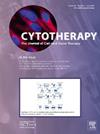Results of the Phase I/IIb EXCELLENT trial evaluating the safety and efficacy of transendocardial injection of expanded autologous CD34+ cells in patients with recent myocardial infarction
IF 3.7
3区 医学
Q2 BIOTECHNOLOGY & APPLIED MICROBIOLOGY
引用次数: 0
Abstract
Background & Aim
Acute myocardial infarction is followed by irreversible cardiomyocyte necrosis that leads to left ventricular (LV) disfunction and detrimental clinical outcomes. CD34+ cell-based therapy has emerged as an option to repair the myocardium and improve outcomes. After AMI, CD34+ cells are mobilized from the bone marrow to the peripheral blood and the extent of this mobilization is significantly correlated with heart regeneration and functional improvement. In a pilot study, we showed that intramyocardial administration of autologous CD34+ cells leads to long term improvement with average survival of 17 years, compared to the 5-year survival generally observed in 50% of AMI patients. CD34+ cells promote revascularization and cardiomyocyte regeneration through the secretion of paracrine factors. Here, we describe the results of the EXCELLENT study, an international multicenter randomized open label Phase 1/2b clinical trial to evaluate the safety and efficacy of transendocardial injections of autologous expanded CD34+ cells in post-AMI patients (NCT02669810).
Methodology
Thirty-three participants with a large AMI and LV ejection fraction <50% were randomized to the treatment plus standard of care arm and 16 participants to the standard of care arm. Participants randomized to intervention were treated with lenograstim for 5 days before blood cell harvest from which autologous CD34+ cells were purified and expanded using an automated GMP compliant platform. The primary endpoint was the incidence of major adverse cardiac events over 6 months. The main secondary endpoints included the improvement of LV end systolic volume index and the viability of the infarcted segments over 6 months.
Results
There were no significant differences in baseline values between the patients in the two treatment arms and more than 90% of patients presented with microvascular obstructions. The transendocardial injection procedure was considered feasible and safe and there were no serious adverse events related to the product. There were favorable changes in blinded central reading secondary endpoints. Autologous expanded CD34+ cells improved remodeling as suggested by congruent favorable changes in viability (infarcted zone), left ventricular dimensions, NT-proBNP, and quality of life.
Conclusion
The long-term effects on these patients are being evaluated in a 10-year follow-up study. As observed in the pilot study, we believe that this therapy has the potential to improve the long-term clinical outcome of these patients.
I/IIb期优秀试验的结果评估经心内膜注射扩增的自体CD34+细胞治疗近期心肌梗死患者的安全性和有效性
背景,急性心肌梗死之后是不可逆的心肌细胞坏死,导致左心室(LV)功能障碍和有害的临床结果。基于CD34+细胞的治疗已成为修复心肌和改善预后的一种选择。AMI后,CD34+细胞从骨髓被动员到外周血,这种动员的程度与心脏再生和功能改善显著相关。在一项初步研究中,我们发现心肌内给予自体CD34+细胞可导致平均生存期为17年的长期改善,而通常50%的AMI患者的5年生存期为5年。CD34+细胞通过分泌旁分泌因子促进血运重建和心肌细胞再生。在这里,我们描述了一项优秀的研究结果,这是一项国际多中心随机开放标签1/2b期临床试验,旨在评估经心内膜注射自体扩增CD34+细胞治疗ami后患者的安全性和有效性(NCT02669810)。方法33例AMI和左室射血分数≥50%的患者随机分为治疗加标准护理组,16例患者分为标准护理组。随机分配到干预组的参与者接受lenograstim治疗5天,然后采集血细胞,使用自动化GMP合规平台纯化和扩增自体CD34+细胞。主要终点是6个月内主要心脏不良事件的发生率。主要次要终点包括左室收缩容积指数的改善和梗死段在6个月内的生存能力。结果两组患者的基线值无显著差异,90%以上的患者出现微血管阻塞。经心内膜注射过程被认为是可行和安全的,并且没有与产品相关的严重不良事件。盲法中心阅读次要终点有有利的变化。自体扩增的CD34+细胞改善了重构,这表明在活力(梗死区)、左心室尺寸、NT-proBNP和生活质量方面都有一致的有利变化。结论对这些患者的长期影响正在一项为期10年的随访研究中进行评估。正如在初步研究中观察到的,我们相信这种疗法有可能改善这些患者的长期临床结果。
本文章由计算机程序翻译,如有差异,请以英文原文为准。
求助全文
约1分钟内获得全文
求助全文
来源期刊

Cytotherapy
医学-生物工程与应用微生物
CiteScore
6.30
自引率
4.40%
发文量
683
审稿时长
49 days
期刊介绍:
The journal brings readers the latest developments in the fast moving field of cellular therapy in man. This includes cell therapy for cancer, immune disorders, inherited diseases, tissue repair and regenerative medicine. The journal covers the science, translational development and treatment with variety of cell types including hematopoietic stem cells, immune cells (dendritic cells, NK, cells, T cells, antigen presenting cells) mesenchymal stromal cells, adipose cells, nerve, muscle, vascular and endothelial cells, and induced pluripotential stem cells. We also welcome manuscripts on subcellular derivatives such as exosomes. A specific focus is on translational research that brings cell therapy to the clinic. Cytotherapy publishes original papers, reviews, position papers editorials, commentaries and letters to the editor. We welcome "Protocols in Cytotherapy" bringing standard operating procedure for production specific cell types for clinical use within the reach of the readership.
 求助内容:
求助内容: 应助结果提醒方式:
应助结果提醒方式:


